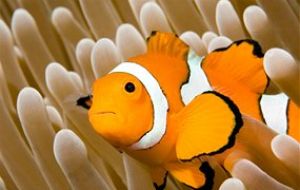MercoPress. South Atlantic News Agency
Australian experts link carbon dioxide emissions effects on fish brain and nervous system
 The testing was done with baby coral fishes in sea water containing higher levels of CO2
The testing was done with baby coral fishes in sea water containing higher levels of CO2 Rising human carbon dioxide emissions may be affecting the brains and central nervous systems of sea fish, with serious consequences for their survival, according to Australian research.
The researchers found that carbon dioxide concentrations predicted to occur in the ocean by the end of this century will interfere with fishes' ability to hear, smell, turn and evade predators.
The Australian Research Council's Centre of Excellence for Coral Reef Studies says it had been testing the performance of baby coral fishes in sea water containing higher levels of dissolved CO2 for several years.
“And it is now pretty clear that they sustain significant disruption to their central nervous system, which is likely to impair their chances of survival,” says study co-author Professor Phillip Munday.
In a paper published in the journal Nature Climate Change, Munday and his colleagues also detail what they say is world-first evidence that high CO2 levels in sea water disrupts a key brain receptor in fish.
This causes marked changes in their behaviour and sensory abilities.
“We've found that elevated CO2 in the oceans can directly interfere with fish neurotransmitter functions, which poses a direct and previously unknown threat to sea life,” says Munday.
The team began by studying how baby clown and damsel fishes performed alongside their predators in CO2-enriched water. They found that while the predators were somewhat affected, the baby fish suffered much higher rates of attrition.
“Our early work showed that the sense of smell of baby fish was harmed by higher CO2 in the water, meaning they found it harder to locate a reef to settle on or detect the warning smell of a predator fish,” says Munday.
The team then examined whether fishes' sense of hearing, used to locate and home in on reefs at night, and avoid them during the day, was affected.
“The answer is, yes it was. They were confused and no longer avoided reef sounds during the day. Being attracted to reefs during daylight would make them easy meat for predators.”
The research also showed that the fish also tended to lose their natural instinct to turn left or right - an important factor in schooling behaviour.
“All this led us to suspect it wasn't simply damage to their individual senses that was going on, but rather that higher levels of carbon dioxide were affecting their whole central nervous system.”
Munday says around 2.3 billion tonnes of human CO2 emissions dissolve into the world's oceans every year, causing changes in the chemical environment of the water in which fish and other species live.




Top Comments
Disclaimer & comment rules-

Read all commentsThe researchers found that carbon dioxide concentrations predicted to occur in the ocean by the end of this century...
Jan 17th, 2012 - 11:00 am 0No, projected, in a computer simulation. Anything can be linked to anything if they try hard enough. This smacks of desperation, but someone is paying for this...and it's us.
Commenting for this story is now closed.
If you have a Facebook account, become a fan and comment on our Facebook Page!